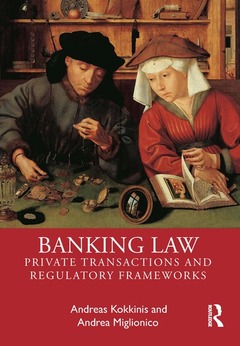Description
Banking Law
Private Transactions and Regulatory Frameworks
Authors: Kokkinis Andreas, Miglionico Andrea
Language: English
Subjects for Banking Law:
Keywords
UK Bank; Modern banking law; MiFID II; European banking union; CRD Iv; Global financial crisis; UK Financial System; Banking regulation; EU Law; Bank–customer relationship; Major UK Bank; Large UK Bank; Micro-prudential Regulation; Basel III; UK Financial Market; EU Banking Sector; SIFIs; SSM Regulation; Prudential Regulation; Insolvency Proceedings; FCA; UK Banking Sector; FSMA; DGS; UK Corporate Governance Code; EU Bank; Macro-prudential Supervision; Customer Due Diligence; Variable Remuneration; Money Advice Service
55.07 €
In Print (Delivery period: 14 days).
Add to cartPublication date: 03-2021
· 17.4x24.6 cm · Paperback
166.30 €
In Print (Delivery period: 14 days).
Add to cartPublication date: 03-2021
· 17.4x24.6 cm · Hardback
Description
/li>Contents
/li>Readership
/li>Biography
/li>
Banking regulation and the private law governing the bank-customer relationship came under the spotlight as a result of the global financial crisis of 2007?2009. More than a decade later UK, EU and international regulatory initiatives have transformed the structure, business practices, financing models and governance of the banking sector. This authoritative text offers an in-depth analysis of modern banking law and regulation, while providing an assessment of its effectiveness and normative underpinnings. Its main focus is on UK law and practice, but where necessary it delves into EU law and institutions, such as the European Banking Union and supervisory role of the European Central Bank. The book also covers the regulation of bank corporate governance and executive remuneration, the promises and perils of FinTech and RegTech, and the impact of Brexit on UK financial services.
Although detailed, the text remains easy to read and reasonably short; pedagogic features such as a glossary of terms and practice questions for each chapter are intended to facilitate learning. It is a useful resource for students and scholars of banking law and regulation, as well as for regulators and other professionals who are interested in reading a precise and evaluative account of this evolving area of law.
Part I: Banks and their regulators. 1. The banking system; 2. Systemic risk and systemic stability in the prudential banking framework; 3. The regulatory architecture of the UK banking system. Part II: The business of banks. 4. EU harmonisation of the banking regulatory framework; 5. The relationship between banks and customers; 6. Business conduct regulation and financial consumer protection; 7. Accounts and payment methods; 8. Clearing and settlement process; 9. Business and consumer lending; 10. Money laundering and terrorist financing. Part III: Preventing banking crises. 11. Regulation of bank capital and liquidity; 12. The regulation of bank corporate governance, executive remuneration and senior managers accountability; 13. FinTech and automation in banks. Part IV: Managing bank failures. 14. UK banking resolution and the EU Single Resolution Mechanism; 15. Deposit insurance and banking stability; 16. The regulation of non-performing loans; 17. The impact of Brexit on the banking sector; Post scriptum:temporary modifications to banking law and regulation in response to the Covid-19 public health emergency
Andreas Kokkinis is Senior Lecturer in Corporate Law and Financial Regulation at the University of Birmingham. Before that he was an Associate Professor at the University of Warwick, and he has also taught at University College London (UCL) and the University of Kent. He holds a PhD from UCL (2014), an LLM (Master of Laws) from the London School of Economics (2009) and an LLB from the National University of Athens (2008).
Andrea Miglionico is Lecturer in Banking and Finance Law at the University of Reading. Prior to joining Reading he was an Associate Lecturer, a Research and Teaching Fellow at the Centre for Commercial Law Studies (CCLS) at Queen Mary University of London. He received his LLM from the London School of Economics and his PhD from Queen Mary University of London.
These books may interest you

Bank Risk, Governance and Regulation 126.59 €



